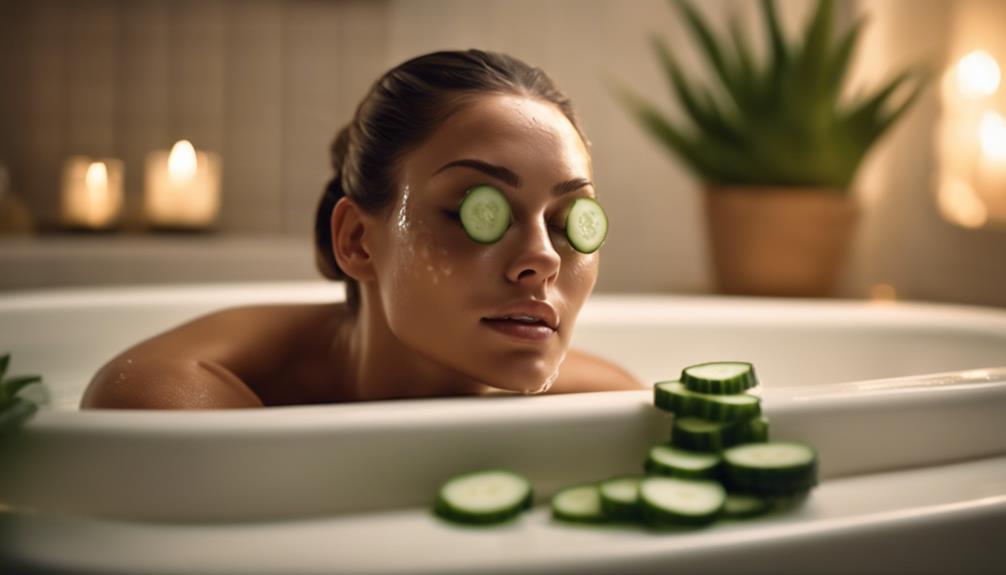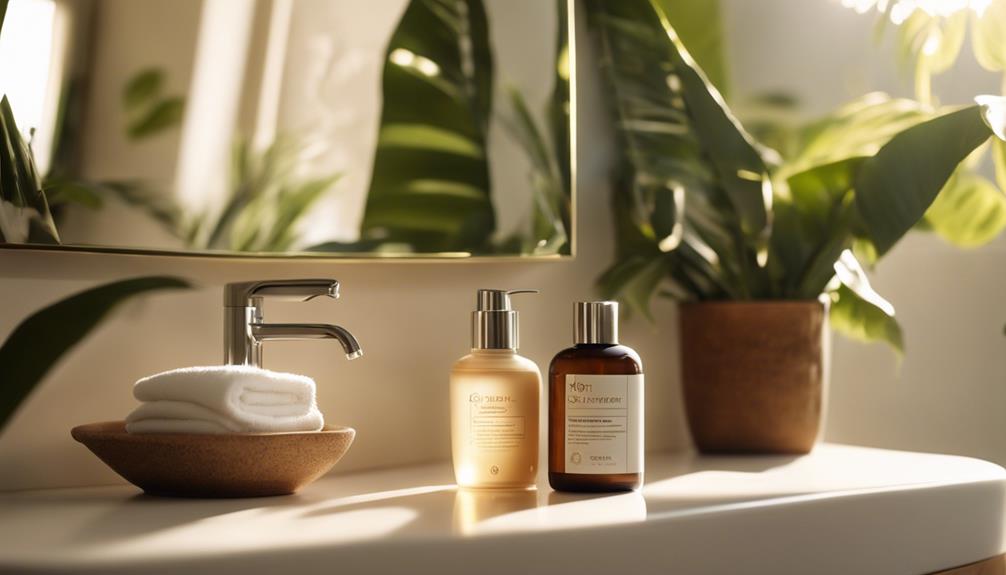To achieve your perfect glow, begin by understanding your skin type – this might require a bit of detective work! Light skin is prone to quick sunburns, while darker skin tans easily. Develop a tanning regimen that works for you, starting with short sessions to avoid looking overly red. Keeping your skin hydrated is essential, so make sure to drink plenty of water and moisturize before and after tanning. Remember to exfoliate for a smooth base and change positions to prevent unwanted tan lines. With some care and strategic planning, you’ll radiate like a superstar! Believe me, there’s even more to explore!
Key Takeaways
- Identify your skin type using the Fitzpatrick Scale to tailor your tanning sessions for optimal results.
- Start with short tanning sessions and gradually increase duration to prevent overexposure and maintain skin health.
- Exfoliate your skin the day before tanning for a smooth surface and even tan application.
- Hydrate your skin daily and apply moisturizer before and after tanning to enhance color absorption and longevity.
Identifying Your Skin Type
To effectively tailor your tanning plan, you first need to identify your skin type using the Fitzpatrick Scale.
This scale helps you understand how your skin reacts to sun exposure, and trust me, it's a game changer! If you're fair-skinned, you might burn like toast in the sun, while darker skin tones can soak up rays more easily.
Knowing your skin type means you can choose the right tanning sessions. For instance, if you're on the lighter side, starting with shorter sessions helps you build a base tan without looking like a lobster!
Crafting a Tanning Plan

Creating a personalized tanning plan starts with understanding your skin type and setting a schedule that optimizes your results while minimizing risks. It's like planning a fun day out—you want to enjoy it without getting too tired, right?
Here's how to craft your perfect plan:
- Know your skin type, using the Fitzpatrick Scale.
- Schedule sessions based on your skin's needs (like 1-2 times a week for fair skin).
- Gradually increase your tanning time to avoid overcooking (no one likes burnt toast!).
With this strategy, you'll be on your way to achieving that sun-kissed glow while keeping your skin happy and healthy!
Effective Tanning Techniques

Understanding effective tanning techniques is essential for achieving an even, sun-kissed glow while protecting your skin from damage.
First, start your tanning journey with shorter sessions—think of it as dipping your toes into a pool rather than diving in headfirst! Gradually increase your time under those UV rays, and always stick to your skin type's recommended session frequency.
Make sure to exfoliate the day before to create a smooth canvas, just like prepping a wall before painting. And hey, ditch the makeup—your skin deserves a break!
Mix up your positions during sessions, too, to avoid those pesky tan lines. Remember, it's all about balance, so listen to your skin, and you'll be rocking that glow in no time!
Importance of Skin Hydration

Your skin's hydration is essential for achieving a healthy, radiant tan and preventing issues like peeling or dryness.
Think of your skin like a sponge; when it's dry, it doesn't absorb well, and that can affect your tan!
To keep your skin in top shape, remember to:
- Drink plenty of water daily to keep skin plump and happy.
- Use a good moisturizer before tanning to lock in moisture.
- Apply a tan extender post-tan to maintain that glow.
Post-Tanning Care Essentials

To maintain a vibrant tan and keep your skin healthy, it's crucial to follow a consistent post-tanning care regimen right after your session.
First things first, slather on a good moisturizer to lock in that glow and prevent peeling—think of it as giving your skin a cozy blanket!
Stay hydrated, too; drink plenty of water to help your skin feel its best.
You might even want to try a tan extender, which is like a magic potion for prolonging your tan.
Keep an eye on how your skin's reacting; if it starts to feel dry or irritated, don't hesitate to adjust your routine.
Safety Precautions for Tanning

Prioritizing safety during tanning sessions is essential for protecting your skin from potential damage. Think of your skin like a delicate balloon; you wouldn't want to pop it, right?
Here are some safety tips to keep in mind:
- Know Your Skin Type: Use the Fitzpatrick Scale to guide your tanning sessions.
- Limit Exposure Time: Start with shorter sessions and gradually increase, just like you'd dip your toes into a pool before jumping in!
- Hydrate: Drink plenty of water and moisturize before and after tanning to keep skin happy.
Troubleshooting Tanning Issues

Identifying and addressing common tanning issues can help guarantee a more successful and even tan. You might find yourself dealing with uneven patches or unexpected redness, but don't worry! Here's a handy table to troubleshoot those pesky problems:
| Issue | Cause | Solution |
|---|---|---|
| Uneven Tan | Skipping exfoliation | Exfoliate 24 hours prior |
| Redness/ Irritation | Overexposure | Reduce session duration |
| Peeling Skin | Dehydration | Moisturize before and after |
| Splotchy Areas | Inconsistent tanning positions | Rotate during sessions |
| Fading Tan | Lack of hydration | Use tan extenders regularly |
Frequently Asked Questions
Can I Tan if I Have a Sunburn?
You shouldn't tan with a sunburn. Your skin needs time to heal, and tanning can worsen irritation and lead to more damage. Focus on soothing your sunburn first before considering any tanning sessions.
How Can I Speed up the Tanning Process?
Speeding up your tanning process is like baking a cake—patience is key. Start with shorter sessions, hydrate your skin, and use a tan extender. Gradually increase exposure time for an even, lasting glow.
Are Tanning Products Safe for Sensitive Skin?
Tanning products can irritate sensitive skin, so you should always patch test first. Look for hypoallergenic and fragrance-free options, and consult a dermatologist if you have specific concerns to guarantee your skin stays safe.
What Should I Wear During Tanning Sessions?
During tanning sessions, you should wear minimal clothing to guarantee even coverage. Opt for a swimsuit or comfortable, loose-fitting attire. Avoid makeup and jewelry to prevent uneven tanning and protect your skin's integrity.
Can I Tan Outdoors After Using a Tanning Bed?
Tanning outdoors after using a tanning bed's like layering a sunset; it can enhance your glow. Just remember, your skin needs time to rest. Wait at least 24 hours to avoid overexposure and irritation.
Are Tanning Tips and Sun-Kissed Glow Techniques the Same?
Are Tanning Tips and Sun-Kissed Glow Techniques the Same? Tanning tips and sun-kissed glow techniques are not the same. Tanning typically involves prolonged exposure to the sun or tanning beds, while achieving a perfect sunkissed glow today can be done through self-tanners or bronzing makeup for a safer alternative.
Conclusion
So, as you set off on your tanning adventure, remember: it's like baking a cake—you want to take it slow and steady for the best results!
By knowing your skin type and following our tips, you can achieve that golden glow without turning into a lobster.
Keep your skin hydrated and don't forget the sunscreen, because nobody wants a sunburn as their souvenir!
Now, go out there and shine bright, like the star you are!









